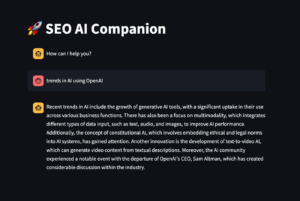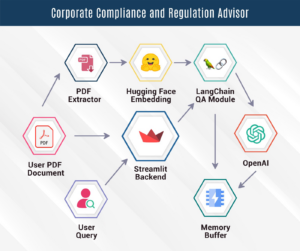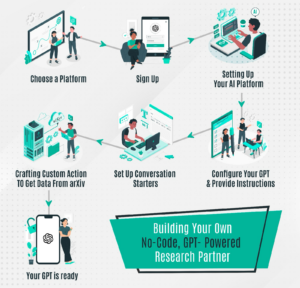
Embarking on a journey into AI entrepreneurship unveils an array of exciting opportunities driven by rapid technological advancements. To thrive in this innovative landscape, understanding how to navigate its complexities is essential. Whether you are launching your first AI startup or expanding into new domains, our “How to Kickstart AI Entrepreneurship: A Step-by-Step Guide” is an invaluable resource.
This comprehensive guide delves into the intricacies of AI entrepreneurship, which is continually reshaping various industries. It offers a detailed exploration of diverse AI possibilities, practical strategies to tackle common challenges, and introductions to AI product accelerator programs. With this guide, you’ll gain the necessary strategies to foster a successful AI startup, leverage cutting-edge AI tools, and stay abreast of the latest industry trends.
If your goal is to leverage AI’s immense potential to create substantial impact, this guide paves the way. Transform your ambitious ideas into tangible realities and navigate the ever-evolving landscape of AI entrepreneurship with confidence and clarity.
Exploring AI Entrepreneurship: Emerging Opportunities
AI entrepreneurship is significantly reshaping the global economy, driven by rapid technological advancements and a growing demand for innovative solutions. AI startups have become key players, redefining traditional models and gaining competitive advantages by leveraging unique technology capabilities.
This surge highlights a pivotal intersection of technology and entrepreneurship. Startups are tapping into AI to address complex issues across various sectors. In healthcare, AI provides predictive analytics and personalized treatment plans. In the finance sector, it’s enhancing risk management and enriching customer service experiences.
Meanwhile, the automotive industry is experiencing a transformation through AI entrepreneurship. Startups are at the forefront, pioneering self-driving cars and redefining mobility concepts. The retail sector is no different; startups streamline logistics, enhance customer interactions, and refine marketing strategies, raising productivity standards.
The value of AI entrepreneurship shines through the adoption of AI solutions, as entrepreneurs harness AI’s capabilities to glean insights from vast datasets. This leads to informed decision-making and helps businesses detect patterns and anticipate market trends more effectively.
Despite the expansive opportunities AI entrepreneurship offers, new challenges surface for aspiring entrepreneurs. The next section will delve into strategies to anticipate and overcome common hurdles faced by AI startups, ensuring successful navigation of this rapidly evolving landscape.
Overcoming Challenges in AI Entrepreneurship
Entering the field of AI entrepreneurship is both exhilarating and demanding. Being aware of these hurdles from the start can prepare you for a smooth journey towards success.
- Investment Costs and Funding: AI ventures often require hefty investments in technology, research, and a skilled workforce. Securing this necessary funding is not easy, with nearly half of startups identifying it as a primary challenge. To attract funding from angel investors, venture capitalists, and crowdfunding, a well-crafted business plan is essential.
- Recruitment and Talent Retention: The competitive landscape makes recruiting skilled professionals, such as data scientists and engineers, a significant challenge. Companies often collaborate with universities and offer stock incentives to entice top talent. Retaining them involves fostering a stimulating work environment and providing opportunities for continuous skill development.
- Ethical and Regulatory Challenges: Navigating ethical and regulatory issues, like data privacy and AI bias, is crucial. With approximately 60% of AI firms prioritizing ethical guidelines, establishing these practices early builds consumer trust and minimizes risks.
Strategic planning is vital in managing these challenges, forming a strong foundation for new AI entrepreneurs. Structured support systems, such as accelerator programs, provide the mentorship and funding essential for sustained success. These elements will be further discussed in our upcoming sections.
AI Product Accelerator: Boosting Entrepreneurship
Tackling AI entrepreneurship involves overcoming challenges like securing funds and mastering technology. The AI Product Accelerator addresses these issues, paving the way for entrepreneurs to thrive.
This comprehensive 12-week program provides startup founders with essential resources and guidance. Through structured coaching, interactive workshops, and a supportive community, it aims to overcome the obstacles AI entrepreneurs face. Participants benefit from mentors experienced in AI, who come from industries known for success. These experts are instrumental in fine-tuning products, devising market strategies, and establishing connections with investors and collaborators.
The program creates a collaborative environment where AI entrepreneurs learn from peers, fostering community and shared knowledge. This approach nurtures cooperation over competition, with 71% of founders forming lasting partnerships that advanced their progress.
Tailored for early-stage AI startups, the program transforms innovative ideas into market-ready solutions. It equips entrepreneurs with the tools and networks needed to thrive, resulting in streamlined operations and stronger market entry plans.
Building on the foundation provided by the accelerator, we can explore strategies for successful AI startups. These strategies enable entrepreneurs to leverage their growth and build enduring, innovative AI enterprises.
Building a Successful AI Startup
Creating a thriving AI startup demands a keen understanding of artificial intelligence and a well-crafted business plan. AI entrepreneurship offers not just challenges but also vast opportunities. Follow these strategic steps to help your AI startup succeed.
- Develop an Original AI Business Model
- Success in AI entrepreneurship stems from having a unique business model. Utilizing advanced AI technology to provide unparalleled value is key. Identify market gaps, or improve existing areas with new AI features. For instance, AI-driven health diagnostic firms address significant healthcare issues with their innovative solutions.
- Focus on Scalability for Growth
- Scalability is crucial for growth. AI startups should leverage cloud computing to build versatile and scalable products. Success stories confirm that 70% of thriving AI startups invest in scalable infrastructures from the outset. This enables them to manage increased demand while ensuring quality.
- Emphasize Customer-Centric Development
- Customer-centricity is pivotal. AI initiatives like aiproductaccelerator.com prioritize user experience by incorporating feedback. Agile development keeps startups responsive. Moreover, AI-driven analytics provide immediate insights into customer preferences, aiding in refining products and expanding market reach.
By implementing these strategies, entrepreneurs can move on to our next topic: “Maximizing AI Tools and Applications for Entrepreneurs.” This section will cover leveraging AI technologies throughout business evolution, emphasizing their role in achieving market leadership.
Leveraging AI for Entrepreneurship Success
Diving into AI entrepreneurship involves harnessing the power of AI tools to transform business operations and drive innovation. These tools enhance workflow efficiency and productivity, helping businesses gain a competitive edge.
One pivotal aspect of AI entrepreneurship is the use of AI content and automation tools. For instance, platforms like Jasper and Writesonic generate high-quality content swiftly, freeing up time for strategic planning. Furthermore, automation solutions such as Zoho CRM manage routine tasks, allowing entrepreneurs to concentrate on impactful projects.
AI’s adaptability can provide tailored benefits across various sectors. In healthcare, it offers predictive diagnostics, whereas in finance, AI is integral to fraud detection. In manufacturing, predictive maintenance leverages AI to optimize efficiency and extend equipment life.
Another advantage of AI is its ability to enhance business personalization. AI-driven analytics ensure a more refined understanding of customer needs, leading to personalized experiences and improved customer interactions. This adaptability aids businesses in refining their strategies and anticipating customer demands efficiently.
Incorporating AI tools not only boosts startup efficiency but also helps businesses adapt to rapid changes. Staying updated with AI developments is crucial for sustained success in this domain. Looking ahead, aligning AI strategies with emerging trends will be key to continuous growth in AI entrepreneurship. Further insights on scaling your AI endeavors will be discussed in upcoming sections.
Exploring AI Entrepreneurship: Key Trends and Prospects
The landscape of AI entrepreneurship is evolving rapidly, presenting a wealth of opportunities for innovative minds. Entrepreneurs navigating this dynamic realm can position their ventures as market leaders by harnessing critical trends.
One significant trend is the rising demand for AI-driven personalization across industries. Businesses are eager for AI solutions that offer tailored experiences—a golden chance for entrepreneurs to gain substantial market share by crafting these personalized technologies. Meanwhile, autonomous AI systems are independently transforming sectors such as healthcare, finance, and transportation. Startups that focus on these technologies can enhance efficiency and decision-making, making them attractive to tech-savvy consumers.
Moreover, untapped fields like agriculture are ripe with potential, thanks to predictive analytics and autonomous machinery. Entrepreneurs leveraging these advancements can capture new market segments. Yet, responsible AI use is paramount. Addressing ethical concerns, such as data privacy and bias, enhances venture credibility and fosters public trust.
Finally, AI product accelerator programs and strategic partnerships provide essential resources for emerging businesses. In this ever-changing landscape, scalability and adaptability are vital, enabling startups to thrive amidst continual technological advances.
Conclusion
Embarking on the journey of AI entrepreneurship opens exciting opportunities for innovation and growth. In exploring the thriving AI landscape, we’ve highlighted numerous possibilities for aspiring entrepreneurs. By grasping both its challenges and benefits, you can confidently engage in this rapidly evolving field.
Utilizing AI product accelerator programs and advanced tools can significantly boost development speed and encourage essential innovation. Strategic planning and leveraging cutting-edge technology are crucial for establishing successful AI startups.
The future of AI entrepreneurship is vast and brimming with potential. With the knowledge gained here, you are well-equipped to navigate the AI domain effectively. Begin by identifying a niche, crafting a compelling value proposition, and applying AI to create groundbreaking solutions in your industry.
Embrace the future, tackle challenges head-on, and let your passion drive the next chapter of AI entrepreneurship.
About AI Product Accelerator
AI Product Accelerator offers a transformative 12-week program tailored for aspiring and experienced entrepreneurs aiming to create and launch impactful AI products. The program bridges the gap between innovative ideas and market-ready solutions by delivering exceptional coaching, actionable insights, and a collaborative community.
In a rapidly evolving technological landscape, AI Product Accelerator stands out by empowering individuals to turn groundbreaking AI concepts into reality, leading to thriving business solutions.
Ready to turn your AI vision into a market success? Join AI Product Accelerator now.



